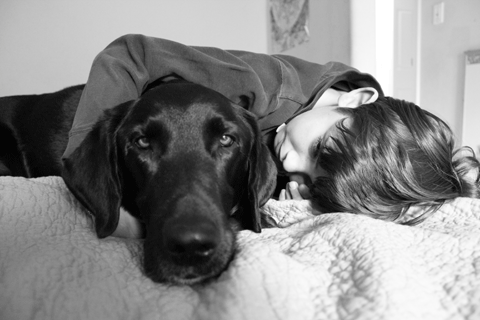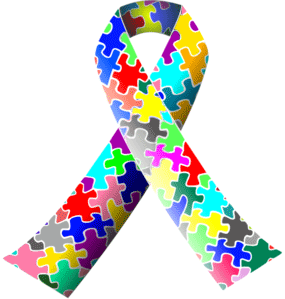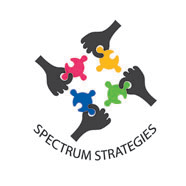Frequently asked questions
 |
"We live in the South Bay. Are we eligible for your programs?"Spectrum Strategies operates out of Contra Costa County. At this time, our Siblings group is based in the Walnut Creek area. Depending on demand and funding, we strive to expand the Siblings group to other cities and counties. Our "Bravo" PAL dog placement program (once funded) is more geographically expansive, with connections to trainers in Walnut Creek and San Francisco. We might consider a foster family or a family match in other nearby areas, provided that it is not too far for an approved trainer to work with you. |
"We have a child with Angelman's Syndrome, whose brother could benefit from the Sibling program. Are we eligible to participate in either of your program?
Yes. Although Spectrum Strategies was originally founded to assist Autism siblings, we recognize that all siblings living with brothers or sisters with other disabilities share many commonalities. We welcome a wide range of siblings to join our support groups.
"Where do you find the dogs for the 'Bravo' PAL Program?"
We have relationships with well established and reputable shelters. We are selective. A dog must demonstrate the appropriate temperament and sense of connectedness with people, as well as indicate a basic responsiveness to training. In short, we need to see that it can be a good PAL. We would not consider dog that is excessively timid, flinchy or demonstrates other potential problem behaviors for a family with a child with Autism (such as "guarding" of food, toys or other objects) a suitable candidate for our program.
"Who trains the dog for the 'Bravo' PAL program? Do you train the dog for us and deliver it to our home?"
You, as the family who is matched with a dog, will participate directly in the training of your PAL. When you sign the placement contract, you will be agreeing to commit to at least 6 weeks of individualized training with your dog. It is important for the bonding process that you directly participate in its training. The other agencies who train the dog for the family and deliver a trained dog are typically organizations who provide a Service animal which is trained for a specific purpose for a person with a disability (such as Autism) for that family. Those dogs in those programs cost an average of $18,000. We are not providing the family with a Service dog. We are locating and assessing dogs who we believe will be suitable as a match for one of the families we have interviewed for our program; we fund initial supplies for the dog as well as the 6 weeks of indivudalized training. It is a family pet - it's your PAL! If the family wishes to train their dog to become a Service animal on their own, the family may certainly endeavor to do so on their own.
"Our child with Autism sometimes has aggressive and even violent outbursts. Does this disqualify us from getting a dog through the 'Bravo' PAL Program?"
Each family and dog is assessed individually. A family interested in being matched with a dog will participate in a thorough in-home intake interview. We certainly want to avoid placing dogs in an environment where they will feel unsafe or nervous, or could be harmed. At the same time, having a PAL in this kind of family could help reduce the aggressive / violent outbursts. The bottom line is that "it depends." The idea of the Bravo PAL Program is that the placement is beneficial and stress-reducing for everyone (human and dog alike). For the first year after placement, every family is subject to "spot visits" by the trainer so that we can check in spontaneously and get a realistic idea of life with your PAL. On another note: does your child have a neurotypical sibling aged 8-16 years old? If so, he or she might want to check out our Siblings support group.
"What if the dog eats my favorite slippers or chews my child's Lego Harry Potter castle?"
Yep. That can happen. It's a dog. It gets bored and lonely, just like we do. Don't expect perfectly compliant behavior right away, or not to have to deal with messes or mishaps with your family PAL. It takes about 30 days to see all behaviors emerge. This is why, for the placement family, committing to the training is so very important. Naturally, given our litigious society, and given that the Founder and Executive Director is a lawyer (darn lawyers), placement families and foster families need to sign an Assumption of Risk / Release of Liability clause.
"Can you match us with a Labradoodle or Golden Doodle through the Bravo/PAL Program?"
Doodles are amazing dogs, and we understand their popularity. But they are not a breed found in a shelter or rescue organization, which is one of the cornerstones of the Bravo/PAL family dog matching program. In fact, any type of so-called "hypo-allergenic" dog (usually a poodle breed or mix) is extraordinarily difficult for us to match (and yes, we have tried).
"Why is your Intake Questionnaire for the 'Bravo' PAL program so long? Familes with kids with Autism already have too much paperwork. I thought getting a dog was supposed to make our lives simpler."
We share your contempt for forms and paperwork; it's just no fun! We conduct a thorough intake so that we can manage expectations, and set everyone up for success. We would not characterize owning a dog as "simple." It is a living creature and requires attention, work and commitment. More importantly, it is also an opportunity that can be life changing in many positive ways (especially for families of kids with Autism), which is why we go to all this trouble. Bear in mind that any reputable animal shelter will also require an intake process of at least an hour, but our process is personalized because we facilitate a home visit to get to know your family and home life so that we can try to find the best family PAL match for you. Please note a $45 intake/application fee, which also serves as a tax deductable donation.
 strategies
strategies